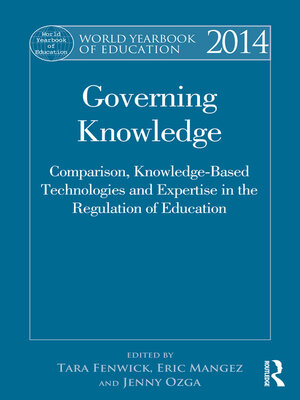World Yearbook of Education 2014
ebook ∣ Governing Knowledge: Comparison, Knowledge-Based Technologies and Expertise in the Regulation of Education · World Yearbook of Education
By Tara Fenwick

Sign up to save your library
With an OverDrive account, you can save your favorite libraries for at-a-glance information about availability. Find out more about OverDrive accounts.
Find this title in Libby, the library reading app by OverDrive.



Search for a digital library with this title
Title found at these libraries:
| Library Name | Distance |
|---|---|
| Loading... |
This latest volume in the World Yearbook of Education Series focuses on a major and highly significant development in the governing of education across the globe: the use of knowledge-based technologies as key policy sources. A combination of factors has produced this shift: first, the massive expansion of technological capacity signalled by the arrival of 'big data' that allows for the collection, circulation and processing of extensive system knowledge. The rise of data has been observed and discussed extensively, but its role in governing and the rise of comparison as a basis for action is now a determining practice in the field of education. Comparison provides the justification for 'modernising' policy in education, both in the developed and developing world, as national policy makers (selectively) seek templates of success from the high performers and demand solutions to apparent underperformance through the adoption of the policies favoured by the likes of Singapore, Finland and Korea.
In parallel, the growth of particular forms of expertise: the rise and rise of educational consultancy, the growth of private (for profit) involvement in provision of educational goods and services and the increasing consolidation of networks of influence in the promotion of 'best practice' are affecting policy decisions. Through these developments, the nature of knowledge is altered, along with the relationship between knowledge and politics. Knowledge in this context is co-constructed: it is not disciplinary knowledge, but knowledge that emerges in the sharing of experience.
This book provides a global snapshot of a changing educational world by giving detailed examples of a fundamental shift in the governing and practice of education learning by:
Drawing on material from around the world, the book brings together scholars from different backgrounds who provide a tapestry of examples of the global production and national reception and mediation of these knowledges and who show how change enters different national spaces and consider their effects in different national settings.







